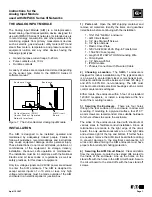
49
0626-M003-1
6.3 Fitting to floor and operation tests
Turn the main switch (
A
) to ON, position
1
.
Select the ALL LIFTS mode.
If the rise button (
D
) is pressed, the lift should go up.
If the descent button (
E
) is pressed, the lift should descend (if not, see
“WARNING” section). Check that it stops by operating thethe upper limit
switch (
24
) and lower limit switch (
25
).
If not, invert the two phases in the switch (
A
) input terminals.
Allow the lift to descend to the lower stop and fasten the counter plates
(
26
) to the floor by means of expansion nogs (
27
) (supplied with the lift),
passing them through the diameter 25 holes in the counter plates.
Then stand the posts upright (fig.
6
). Loosen the screws (
28
) that fasten
the adjustment device (
29
). Using a spirit level on the outside, back and
side of each post, position the posts properly by turning the adjustment
screws (
29
) as required.
When all four posts have been mounted according to the plumb line,
fasten all the screws (
28
).
We recommend checking the parallelism with a wire at the base and at
the head of the posts. A difference of 5 mm is accepted. Diagonals must
be checked too (Fig. 6).
6.3 Befestigung am Boden und Betriebsprüfungen
Den Hauptschalter (
A
) auf ON, Position
1
drehen.
Die Gesamtbetriebsmodalität auswählen.
Wird die Taste “Heben” (
D
) betätigt, muss die Hebebühne hochfahren.
Wird die Taste “Senken (
E
) gedrückt, muss die Hebebühne herunterfahren
(bei Betriebsstörung siehe den Abschnitt VORSICHTSMASSNAHMEN).
Die Arretiereinrichtung überprüfen, indem der obere Endschalter (
24
)
oder der untere Endschalter (
25
) betätigt wird.
Sind diese Funktionen nicht vorhanden, zwei Phasen in den
Eingangsklemmen des Schalters (
A
)umpolen.
Die Hebebühne bis zur unteren Arretiereinrichtung herunterfahren und
die Gegenplatten (
26
) am Fussboden verankern, indem die im Lieferumfang
enthaltenen Spreizdübel (
27
) in die 25 Ø Bohrungen der Gegenplatten
eingesetzt werden.
Nun die Säulen (Abb.
6
) lotrecht positionieren. Die die Justierschrauben
(
29
) arretierenden Schrauben (
28
) lösen. Aussen, innen und seitlich
einer jeden Säule eine Wasserwaage verwenden und die Säulen über
die Justierschrauben (
29
) entsprechend richten.
Sind alle 4 Säulen lotrecht, sämtliche Schrauben (
28
) festspannen.
Die Parallelität mit einer Schnur unten und oben zwischen den Säulen
überprüfen. Es kann eine Abweichung bis zu 5 mm akzeptiert werden.
Die Diagonalen überprüfen. (Abb. 6)
6
6.3 Fissaggio al pavimento e prove di funzionamento
Ruotare l’interruttore principale (
A
) su ON, posizione
1
.
Selezionare la modalità di funzionamento in complessivo.
Premendo il pulsante di salita (
D
) il sollevatore deve salire
Premendo il pulsante di discesa (
E
) il sollevatore deve scendere
(in caso di mancato funzionamento vedere paragrafo AVVERTENZE).
Controllarne il corretto funzionamento del fine corsa superiore (
24
) e
del fine corsa inferiore (
25
).
In caso di funzioni non rispettate, invertire due fasi nei morsetti di entrata
dell’interruttore (
A
).
Fare scendere il sollevatore fino all’arresto inferiore e fissare al pavimen-
to le contropiastre (
26
) usando i tasselli ad espansione (
27
) (in dotazione
al sollevatore), facendoli passare dai fori diametro 25 delle contropiastre
stesse.
Procedere poi alla messa a piombo delle colonne (fig.
6
): allentare le viti
(
28
) che bloccano il registro (
29
); con bolla appoggiata all’esterno, dietro
e di fianco ad ogni colonna, procedere all’orientamento girando nel senso
necessario le viti di registro (
29
).
Una volta effettuata la messa a piombo di tutte e quattro le colonne,
bloccare tutte le viti (
28
) e successivamente anche le viti (
30
).
Si consiglia di fare una verifica di parallelismo con un filo alla base e alla
testa tra le colonne: la differenza accettata è di mm 5; e poi di fare una
verifica sulle diagonali (Fig. 6).
Summary of Contents for KP442 E DUO
Page 13: ...13 0626 M003 1 NO NO OK Min 1800 2 ...
Page 14: ...14 0626 M003 1 GELEDE STANDAARD 2 KP442NE DUO VS1300BIS ...
Page 22: ...22 0626 M003 1 KP442NE DUO VS1300BIS ...
Page 40: ...40 0626 M003 1 6 C A B D 600 kg 850 kg 40 kg ...
Page 42: ...42 0626 M003 1 2 6 17 18 18 A 19 20 21 3 4 S1 S2 6000mm 6000mm 2252mm 1 2 1 2 3 ...
Page 44: ...44 0626 M003 1 6 3 6 7 8 11 11 10 9 ...
Page 48: ...48 0626 M003 1 6 26 28 29 5 6 24 25 27 30 A B C D X X1 Y Y1 Y Y1 5 mm ...
Page 52: ...52 0626 M003 1 8 6 19 15 cm 30 1 42 2 36 5 mm 8 A 400V 50Hz 3Ph PG29 OFF B C D F G E A ...
Page 54: ...54 0626 M003 1 6 24 25 5 mm 24 43 1 4 2 3 5 6 ...
Page 56: ...56 0626 M003 1 6 0 2 0 5 mm ...
Page 58: ...58 0626 M003 1 1 2 3 3 4 5 6 7 14 15 7 ...
Page 60: ...60 0626 M003 1 7 17 17 18 42 30 40 mm 16 ...
Page 68: ...68 0626 M003 1 8 ...
Page 77: ...77 0626 M003 1 10 ...
Page 78: ...78 0626 M003 1 10 ...
Page 80: ...80 0626 M003 1 10 SOLL 2 LIFT 2 KP442NE DUO VS1300BIS ...
Page 81: ...81 0626 M003 1 10 SOLL 2 LIFT 2 KP442NE DUO VS1300BIS ...
















































